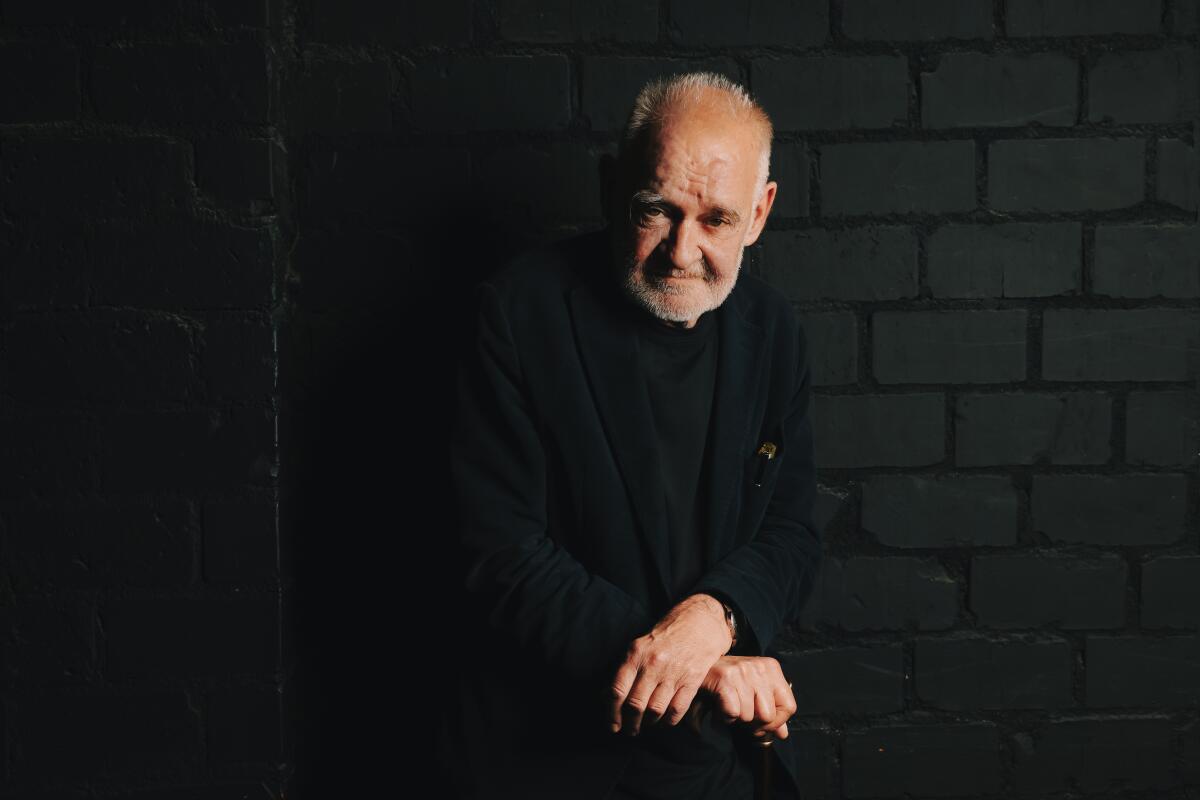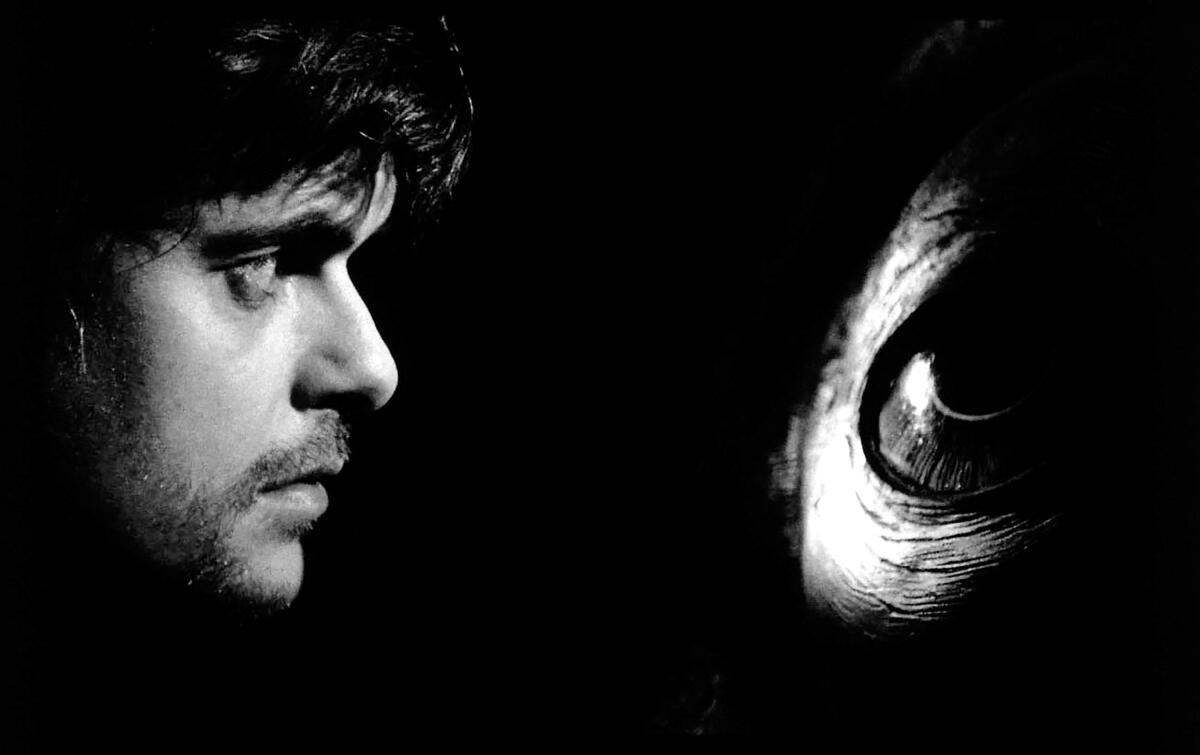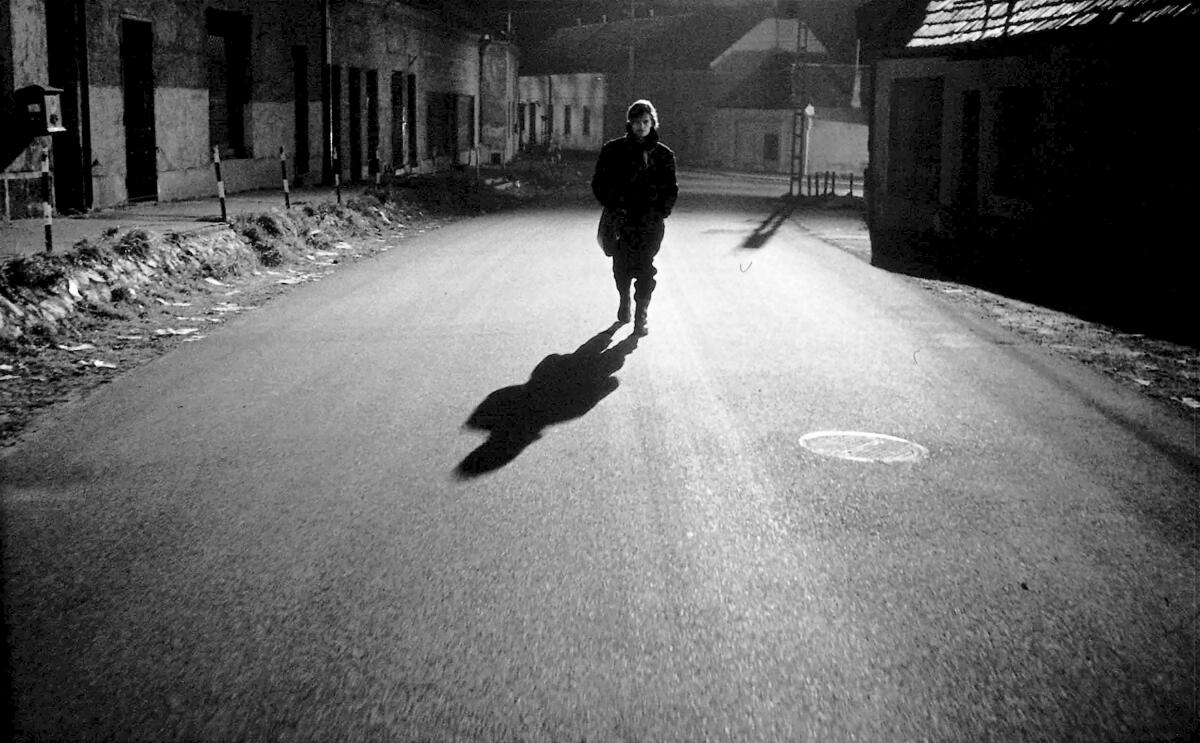Béla Tarr in Hollywood: A film world ‘enfant terrible’ charms L.A. by being himself

- Share via
“It’s too big for me,” Béla Tarr said of Los Angeles while smoking a cigarette on the patio of a West Hollywood hotel. Even under a dimmed California sun, the Hungarian filmmaker’s modestly elegant all-black attire reads distinctively alien against the manicured vegetation and breezy atmosphere. “I could never, ever live here,” he added.
Tarr, 67, a maker of severe, downhearted films that draw outside the lines of traditional storytelling, rarely comes to town. The last time he was here was in 2011, when a malfunctioning projector almost derailed one of his Hollywood screenings. Still, the sizable L.A. fandom around his movies — best described as unflinching contemplations of shared humanity — has always shown up for him.
Last week, Tarr returned to the city for a rare retrospective of his work organized by the American Cinematheque. The series included a screening of his 7½-hour 1994 masterwork “Sátántangó,” which follows several characters surviving the aftermath of the collapse of communism. It quickly sold out.
The four-day celebration, a cinephile’s dream titled “Boundless Damnation” (Tarr’s enthusiasts have their own wavelength), now gives way to a week-long run of the new 4K restoration of 2000’s “Werckmeister Harmonies,” co-directed with his former romantic partner and longtime editor Ágnes Hranitzky. Set in a woeful, unnamed Hungarian village and shot in alluring black-and-white, this melancholic adaptation of László Krasznahorkai’s 1989 novel “The Melancholy of Resistance” centers on a peculiar young man and his uncle, a musician, as a bizarre circus arrives, unleashing chaos.
There’s a deceivingly grave presence to Tarr, reinforced by the philosophical heft of his films. Still, it’s a vibe that dissipates when he playfully tells those in his circle to “f— off” in response to teasing comments about the length or intensity of his work.
“It’s easy to say they are depressing or bleak, but it’s not about that,” he said. “Human beings are very complex, and when you are doing a movie, or any kind of art, you have to try to have empathy for people.”

While intellectually demanding, Tarr’s work is much more approachable than its reputation suggests. There’s a purity of spirit to his stark and unhurried images of ordinary individuals grappling with misery, confusion and occasional joy. His protagonists, often working-class, are caught in the crossfires of history without easy resolution.
Before picking up an 8mm camera as a teenager in Budapest under communist rule, Tarr himself worked a factory job, but wanted to study philosophy. His early ideological run-ins with the authorities blacklisted him from pursuing a formal education, so he turned to the language of cinema.
“All my life I had some social sensibility, and if you see my movies, none of them talk about the people who are usually on the cover of Vanity Fair,” he said.
When asked about a photo that went viral (at least on Tarr Twitter) of him posing with a humble Peruvian man in Lima who makes a living selling pirated copies of his entire oeuvre, Tarr laughed.
“The guy was very proud,” he said. “I visited him, and we took this picture because what can you do? You can’t be angry. I know I’m losing money, but I know the profit those guys are getting is not much, and it doesn’t change my life.”
Niche as Tarr’s formalist style is (“Werckmeister Harmonies,” at 2 hours and 25 minutes, unfolds over just 39 shots), local Tarrheads flocked to the Aero Theatre in Santa Monica and the Los Feliz Theatre to hear from the man himself during lively post-screening conversations.

“They are the most important thing because when you do a movie, you are doing it for the people,” said Tarr about his audience.
“That’s the reason why I do it — or why I did it,” he corrects himself.
Although he hasn’t backpedaled on his stated retirement from moviemaking following the 2011 debut of “The Turin Horse” (at the time, he declared he had said everything he needed to say), Tarr hasn’t forsaken art making altogether. His most recent multimedia project, “Missing People,” about Vienna’s homeless population, premiered in 2019. “Homeless people have no chance to articulate their dignity,” he said on a subject all too familiar to Angelenos.
For four years after quitting filmmaking, Tarr served as head of a unique program at the Sarajevo Film Academy known as the Film Factory, where his motto for his “collaborators,” as he refers to his students, was “no education, just liberation.”
It’s a role that suits him. Night after night during his L.A. residency, Tarr heard from local filmmakers in attendance asking him for advice on how to realize their visions while dealing with an industry known for crushing original perspectives. Tarr told his L.A. devotees to “kick down the door” instead of waiting for one to open. “If you don’t, you will be on the waiting list,” he said during his final Q&A at the Aero.
These days, Tarr seems to get the most fulfillment from mentoring talents from around the world. Wherever he goes, his global network of pupils is there to welcome him.
“I’m developing some new filmmakers who are young — they are trying to find a new way outside the system,” he said. “I want you to be brave. Don’t listen to anything. No more expectations. You have to break the rules. Because in the 21st century, we don’t have rules anymore. You can do a movie with your phone. You are free.”
Though he watches few new releases, Tarr spends his time reviewing his students’ rough cuts, offering feedback and supporting their endeavors where he can. He executive produced the 2021 Icelandic horror drama “Lamb,” from his former mentee Valdimar Jóhannsson, lending his name to the project to facilitate financing. Tarr finds a kindred spirit in anyone hoping to defy the status quo.
“Do you know this French term enfant terrible? That’s what I was,” he said with a mischievous smile. “I was always an outsider, even if somehow my movies got some attention.”
That nonconformist status can largely be attributed to his glacial sense of pacing. But what some perceive as languid Tarr describes as introspective.
“I hate linear storytelling,” said Tarr. “The logic of those films, generally, is action, cut, action, cut. And for me that’s ridiculous. I like to listen for the details, the faces and reactions and all small things. For me, a piece of a wall can be a story itself.”
Amid a writers’ strike largely about the power of platforms, we take a snapshot of the streaming pecking order, from Netflix to (formerly HBO) Max.
Tarr’s search for honesty even extends to his choice of film stock. When Kodak changed its color negative from celluloid to a polyester-based material in the mid-1980s, Tarr chose to stop using it, and to shoot only in black-and-white.
“Those polyester colors are fake,” Tarr explained. “The red is too red. The yellow is too yellow. And when you are doing the grading, you become mad because you cannot find the right dramaturgy for the colors.”
Last Friday night, Los Angeles tested him once again. Minutes into the showing of “Family Nest,” Tarr’s 1979 debut feature about a couple struggling to find housing, the projector at the Los Feliz Theatre crashed, forcing the screening’s cancellation. But that didn’t stop the director from showing genuine care for his audience. Tarr asked the American Cinematheque to reschedule the movie for the following night, his final one in L.A. Despite his accumulated jet lag, the director did a late-night Q&A to make up for the scrapped one.
For Tarr, artists who don’t think about their audience are “not real artists” at all.
“You have a responsibility to the people, and you cannot cheat them,” he said. “When you are waking up at 4 o’clock in the morning and you have to be on the set at 5:15, you are just thinking about how you can do your best, because the audience is intelligent and sensible. I respect them. This is a moral question. I have to surrender, and I have to do my best for them. They are my partners. When I’m working, my ego is nowhere.”
A lovable anarchist, Tarr believes that those who thoughtfully engage with his oeuvre will enjoy the rewards of their investment.
“The question is: How do you feel when you leave the cinema?” Tarr said. “Are you stronger or weaker? My feeling is that people get stronger. If you see some dark or sad s—, and you face it and understand it, you become stronger. This is my logic.”
For all the sorrow he’s depicted onscreen, the man spreads plenty of hope.
More to Read
Only good movies
Get the Indie Focus newsletter, Mark Olsen's weekly guide to the world of cinema.
You may occasionally receive promotional content from the Los Angeles Times.









